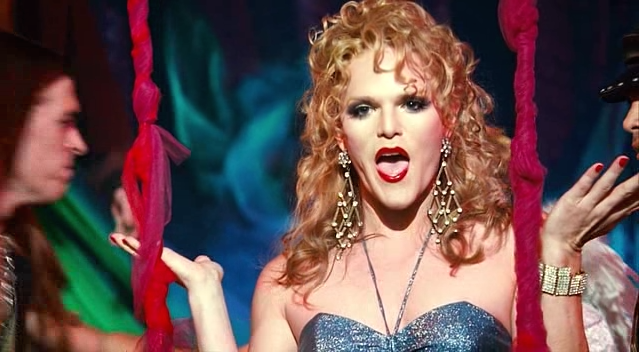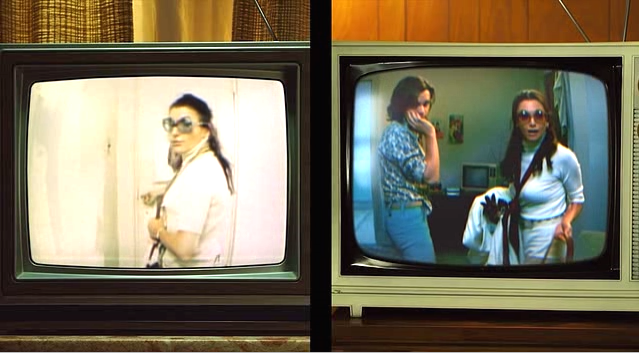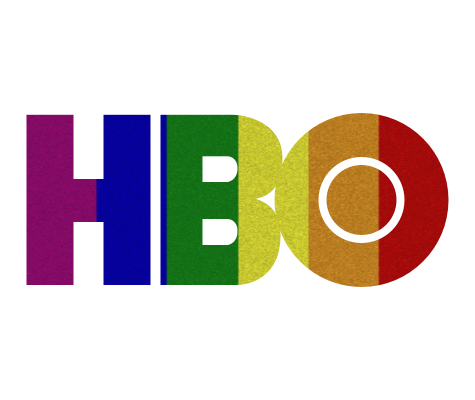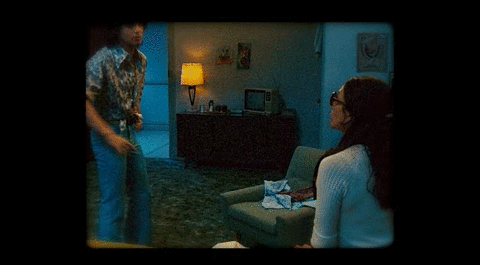HBO’s LGBT History: Cinema Verite (2011)
 Wednesday, November 25, 2015 at 2:37PM
Wednesday, November 25, 2015 at 2:37PM
 Last week we reminisced about Vito Russo with two related docs: the essential The Celluloid Closet and the 2011 HBO doc Vito. This week we turn from a pivotal figure in silver screen LGBT history to a pivotal one for the small screen. I’m talking, of course, of Lance Loud, who famously came out in An American Family in 1973 when the Loud family became the subject of a PBS docuseries, what many deem to be one of the first reality shows in American TV. Directed by Shari Springer Berman & Robert Pulcini, Cinema Verite (watch on HBOGo) follows the behind-the-scenes drama behind that infamous and breakthrough program.
Last week we reminisced about Vito Russo with two related docs: the essential The Celluloid Closet and the 2011 HBO doc Vito. This week we turn from a pivotal figure in silver screen LGBT history to a pivotal one for the small screen. I’m talking, of course, of Lance Loud, who famously came out in An American Family in 1973 when the Loud family became the subject of a PBS docuseries, what many deem to be one of the first reality shows in American TV. Directed by Shari Springer Berman & Robert Pulcini, Cinema Verite (watch on HBOGo) follows the behind-the-scenes drama behind that infamous and breakthrough program.
For Americans, as we saw last week, many of the images they saw of homosexuals on movie screens were outright stereotypes. But they really paled in comparison to the images they were getting from the media. In 1967, CBS aired The Homosexuals an episode of CBS Reports. Here’s a sampling of Mike Wallace’s voice-over in the show:
“The average homosexual, if there be such, is promiscuous. He is not interested or capable of a lasting relationship like that of a heterosexual marriage. His sex life, his love life, consists of a series of one–chance encounters at the clubs and bars he inhabits.”
That by 1973 audiences got to see Lance Loud being openly gay and accepted within his family was a huge step forward (even if, given the time period, his homosexuality was used to further vilify the Louds in the press). More...
In Berman and Pulcini’s film, Lance is played by Thomas Dekker who would be familiar to queer film fans as the lead in Gregg Araki’s 2010 film Kaboom.
Just as in that earlier film, Dekker plays Loud with unabashed zeal; from the very first moments we see and hear him, we know he’s a flaming young man. Thus, it’s understandable he leaves his family in Santa Barbara to head to New York where he stays at the Chelsea Hotel, as (pardon the pun) a loud a declaration of his sexual proclivities as one could make in 1970s America.
One cannot imagine what 1973 audiences made of the scenes between Lance and his mother; as played by Diane Lane, Pat Loud comes off here as obviously knowing what’s up with her son though clearly still uncomfortable to some extent (she all but loses it when her son takes her to a show at La Mama full of “transvestites” that in this film features an all-too familiar face for us Drag Race fans).

“Is that your friend, Candy… the one who wants to marry you?”
“Yes.”
“She’s a man?”
“Well... I haven’t accepted or anything!”
In this sense, Cinema Verite functions as a document of how homosexuality (alongside infidelity and divorce) was at the heart of the both the American family, and reality television writ-large. Lance Loud would go on to become a famous musician, writer, and later one of the many high profile victims of HIV. He died at the age of 50 in 2001, a narrative that became in itself a sequel of sorts to An American Family in Alan and Susan Raymond’s 2003 Lance Loud! A Death in An American Family.
If it’s hard to disentangle the HBO film from the very docuseries it traces, it is because Berman and Pulcini go out of their way to remind us of the very constructedness of their own narrative: they open the film with footage from the Louds and offer it alongside their own footage. Just as Cinema Verite will show how the reality TV sausage is made, the film never forgets that is in itself a fictional recreation, one which plays with its own representational limits. And therein lies the most interesting aspect of this production which clearly speaks back to 1970s social mores even as it plumbs that looking back with a pointed critique of the way non-fictional filmmaking is as much an illusion as anything else.

Thus, while the depiction of Lance both in An American Family and Cinema Verite may read to contemporary audiences as entirely positive (yes, he’s an artiste, and a flamboyant one at that, but far and away from the stereotypes Vito Russo unearthed later in The Celluloid Closet), Berman and Pulcini are moved to include a scene where Loud reads out a review of Gilbert’s PBS show in The New York Times Sunday Magazine: “Lance oozes his leech-like homosexuality with the glee of a grotesque Goyaesque emotional dwarf.” That’s the last straw for the Loud family who then decide to go on a media blitz defending their values even as they belatedly realize that all they had become by that point was a necessary and at times biased reflection of what millions of Americans saw in themselves. In that sense, “cinema verite” is just an ironic reminder of the inability of the camera and the screen to do anything but re-present and thus distort life as is.


Fun Awards Fact: Diane Lane who gets the meatier role (the film is rightly structured around her and her decision to eventually divorce her husband) was rightfully nominated for an Emmy (her second nom), a SAG Award (her second nom), and a Golden Globe (her third nom; I always forget she got improbably nominated for Under the Tuscan Sun). Of course, she was no match for the critical darling that year: Ms Kate Winslet who may just be the giddiest award winner in recent memory and who earned a stackful of awards for her work in Todd Haynes’s Mildred Pierce.
Next Week: I realized we’ve made it this far in our HBO history and we haven’t even once discussed one of my favorite HBO tv series: Big Love, a great example of a show that pushed issues of non-normative domestic arrangements and prickly transgressive sexualities in the guise of a polygamous family drama. And so, I want to revisit the show’s fourth season episode, “Under One Roof” (watch on HBO Go) which featured (in true Russo-ean way) another death by repression amidst a fascinating parallel between the lives of polygamous families and homosexuals.




Reader Comments (2)
I think it's delicious irony that Willam Belli is in this and then had a very successful (albeit different) career that was launched by reality TV.
I remember looking for An American Family clips on Youtube like crazy!